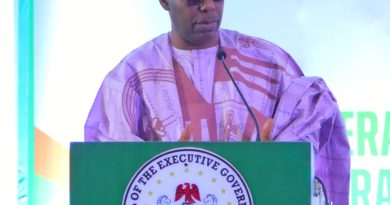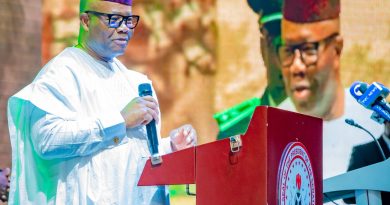Tax Bills: Afenifere Calls For Understanding… Says Tax Reform Not Targeted Against Any Region, Reiterates Call For Restructuring
The pan-Yoruba socio-cultural and socio-political organization, Afenifere, has stated that the tax reform proposed by the federal government has a lot of beneficial potentials.
In a Press Statement released by its National Publicity Secretary, Comrade Jare Ajayi, the body submitted that no region in the country should entertain any fear regarding the distribution of the proceeds of the Value Added Tax (VAT) – as being proposed.
It would be recalled that the Executive arm of government under President Ahmed Bola Tinubu recently (September 3, 2024) submitted four bills to the National Assembly for passage into laws.
According to the government, the bills were “aimed at streamlining Nigerian Tax Administrative processes; enhancing efficiency and eliminating redundancies across the national Tax operations”.
The Bills are
1. Nigeria Tax Bill
2. Nigeria Tax Administration Bill
3. Nigeria Revenue Service {Establishment} Bill which seeks to rename the Federal Inland Revenue Service {FIRS} as the Nigeria Revenue Service and
4. Joint Revenue Board Establishment Bill.The first, Nigeria Tax Bill aims to eliminate unintended multiple taxation and make the economy more competitive; the second, Nigeria Tax Administration Bill, proposes a set of new rules that will harmonize tax administrative processes across federal, state and local jurisdictions. This was meant to ease compliance by tax payers.
The third, the Nigeria Revenue Service {Establishment} Bill seeks to rename the Federal Inland Revenue Service {FIRS} as the Nigeria Revenue Service while the fourth, Joint Revenue Board Establishment Bill proposes the creation of a Joint Revenue Board to replace the Joint Tax Board.
However, some concerned citizens were expressing reservations about the proposed bills, especially the one on Value Added Tax (VAT). Northern State Governors’ Forum (NSGF) and Northern Council of Traditional Rulers and Chiefs at their joint meeting in Kaduna on Monday, October 28, expressed displeasure on the bill particularly the aspects concerning the derivation-based model for Value Added Tax (VAT) distribution among the country’s federating units. Senator Alli Ndume too is vehement in his opposition to the bills, especially the one on VAT.
The pan-Yoruba organization was of the opinion that using or including ‘derivation’ as a factor of distribution would not deprive the Northern States or any other state what is due to them.
“Since people consume items and patronize services in every state, there is no reason why any state will not benefit from the proceeds of VAT collected in their domains, especially going by the relevant section of the proposed bill as well as the Section 163(b) of the 1999 Constitution which talks about derivation in the distribution of revenue from the Federation Account”.
The body was emphatic that the new arrangement stands the chance of encouraging states to do more in generating incomes locally and in contributing more to the national till “if what a state would get is tied to how much such a state contributed”.
Ajayi submitted that the position of Northern Governors and the Traditional Rulers in that zone “further underscores the imperativeness of restructuring the country urgently so that each constituent part, zone or region etc, would be in a position to exploit and largely control the resources within its enclave”.
He added that such an arrangement would not only encourage a healthy competition, it would motivate states and individuals.
He further asserted that rather than trying to look at the assumed areas that the VAT Amendment Bill would be a disadvantage, stakeholders should look at the many positive aspects of the proposed Act and suggestions made on areas needing improvement.
“From experience, where derivation formula has been applied such as the Niger Delta etc., benefiting states have been the gainers for it. Since every state has populations that can engage in activities capable of enhancing VAT, it means that every state has the opportunity of deriving maximum benefits from the new arrangement being proposed”, Ajayi added.
In responding to reservations being expressed on the bills, Chairman of the Presidential Committee on Fiscal Policy and Tax Reforms, Mr. Taiwo Oyedele, repeatedly clarified that the proposed reform of Tax laws is meant to correct the anomalies in current tax laws particularly the VAT distribution model.
The current sharing formula is 15% for the federal government, 50% for States and 35% for the local government councils.
The new bill is proposing 10% for the federal government; 55% for States and 35% for the LGs as contained in Section 22 (12) of the Nigeria Tax Administration Bill.
On the fear being expressed by some on the likelihood of lower revenue for some states, Oyedele gave an assurance that the 5% to be ceded by the FG can be set aside for equalization transfers to cater for any shortfall to a state.
This is to ensure that “no state is worse off in the short term while significantly enhancing economic activities and revenue for all states in the medium to long term.”
Afenifere spokesman expressed the hope that the VAT bill, when it becomes operational, will be part of the instruments to be used to fulfill President Tinubu’s vow on his administration’s commitment to easing the pains of Nigerians and putting the country’s economy on a firm footing




